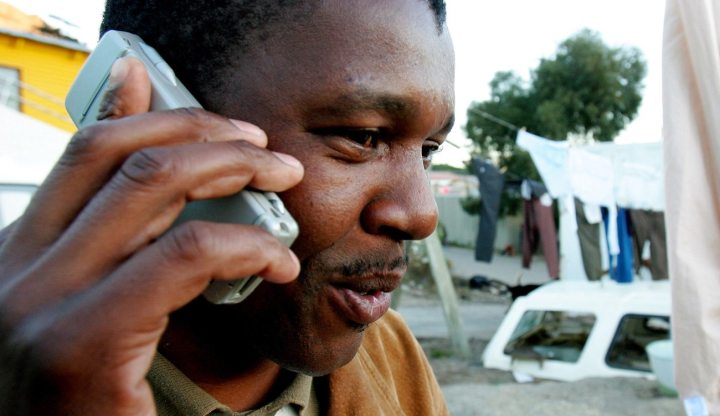South Africa
Mind the gap: using technology for a better life

That there is a growing gap between ordinary South Africans and their elected representatives is no surprise. As one global organisation looks to bankroll ideas that may plug this gap, former minister Jay Naidoo believes a civil society movement that actually caters to the needs of communities - and not the other way around - is what will help South Africa close the distance. By KHADIJA PATEL.
Jay Naidoo was the keynote speaker at a “Making All Voices Count” event at the University of Witwatersrand on Thursday. “Making All Voices Count” is a global initiative that aims to use technology to bridge the divide between people and their governments, particularly in the developing world. It also aims to enable citizens to engage and make their governments more accountable.
Thursday’s event was meant to be a call for innovators to submit ideas on how best technology could plug the gaps between the masses and the elites that govern them. And in a rousing address Naidoo demonstrated why such measures are urgently required.
As South Africa gears itself for another round of electioneering – and several more years of frustration – few will argue with the country’s credentials as a democracy. But as service delivery protests increase, bringing violence, destruction and often death, the hollowness of that democracy is becoming more apparent.
“Democracy and all the formal trappings of democracy are insufficient to guarantee the rights of people,” Naidoo said.
Many communities were fed up with their local governments and some, like those who may be using Gauteng’s freeways, were also losing patience with national government.
Naidoo said that as much as people protested, government did not seem to be listening.
“If one looks at the title of this, ‘Making All Voices Count’, I think it’s not just a grand challenge of development – it’s the core of the grand challenge of development,” he said.
For Naidoo, the struggle against Apartheid was primarily a struggle for South Africans to make their voices count.
“Our struggle for freedom was a struggle for a voice,” Naidoo added. “Because that’s what Apartheid stole from us, our voice, to be human beings. It stole our human dignity.”
Naidoo said the creation of the current gap between government and the citizenry in South Africa could be traced back to the dissolution of the RDP (Reconstruction and Development Programme).
“Two years into our democracy we lost the plot. We buried the Reconstruction and Development Programme,” he said.
Naidoo recalled that at the time, meetings were held with women, students, workers and other citizens, all aimed at gleaning what people wanted after Apartheid. Millions of people had participated in this process, he said.
“One of the things we realised in those days is fighting for voice, not our voice, but the workers finding their voice, the women finding their voice, the civics finding their civic voice, the rural areas finding their rural voice, when those streams came together we had a powerful tsunami that got here.”
But while Naidoo picked apart the circumstances that have led the current disjuncture between people and leaders, he was confident in proposing a way forward.
“We have to go back to the people,” he said.
“Very often, NGOs, powerful activists and great leaders think changes come through technology or holding press conferences. And that’s where we kill the revolution of ideas of morality, of ethics,” he added.
“No country in the world is run by Facebook or Twitter. Don’t fool yourself that social media is going to create the revolution of social values that we need. It’s actually going down to the people and explaining to them what their rights are, equipping them with the right tools and making sure they fight their own battles.”
The solution for Naidoo is quite clear: “We have to go back to the people.”
He used the example of the Eastern Cape, where civil society and labour movements came together cohesively after mass corruption had been uncovered. Collectively they denounced what had happened and plotted a way forward.
“I was very happy that organisations like the Treatment Action [Campaign], Section 27, Union Life, Denosa – representing nurses, were part of a coalition saying this is wrong. They are the key. We must see that whatever we want to do in making voices heard is that we strengthen them – not create more NGOs and more employment and we sit in places like this and think we’re doing a helluva lot of good work,” he said.
He noted out under his stewardship of Cosatu NGOs fed off the labour movement.
“They did not tell us what our strategy should be, what technology uses we could apply, we knew what we wanted to do. They fitted into our programme as social movements and this is a notion you’ve got to get understand. I can’t understand why people have forgotten this lesson of the [1980s] here today,” Naidoo said.
“Because the 80s was about how NGOs supported communities and social movements not the other way around,” he said.
And indeed if civil society can be organised to play that role sufficiently again, then South Africans may well be going some way to having that gap between people and government plugged. DM
Disclosure: Jay Naidoo is an occasional contributor to Daily Maverick.
Photo: A township resident chats on his mobile phone in Hout Bay near Cape Town in this June 22, 2006 file photo. REUTERS/Mike Hutchings


















 Become an Insider
Become an Insider